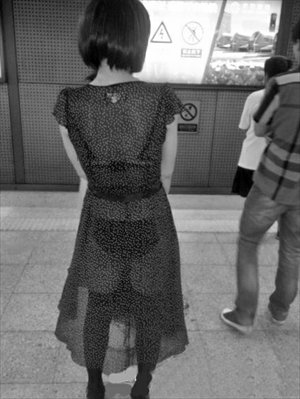Fledgling feminism


The Shanghai Metro sparked debate over what is appropriate attire for women in public after it posted a photo on its official Sina Weibo microblog on June 20 and condemned a young female for wearing a transparent dress. Some 45,000 microbloggers commented on the post, with Web users divided over the Shanghai Metro's call for women to dress more modestly. Two young women even took to city's subway dressed in black robes and held placards with messages including, "I can be flirtatious, but you can't harass."
Beijing seems immune to calls for feminist action, even amid small-scale protests by women erupting sporadically around the country. Despite this summer's trend of see-through clothing being embraced by many women, few female Beijingers are crying out for more rights.
Gaps in gender equality
Several university students occupied men's toilets in Guangzhou in February, calling for greater consideration of women's needs. A woman stripped to raise awareness for lesbian rights at a Shanghai Pride conference last month that mostly advocated rights for homosexuals. The international SlutWalk movement, which advocates women should be allowed to wear whatever they want without being harassed, even reached Hong Kong in December last year.
But the feminist revolution has yet to make its way to Beijing, where instead a mud wrestling contest between bikini-clad women is scheduled for July 14. Event organizers have invited eight women to compete in the contest, with the winner set to pocket 5,000 yuan ($785) in cash plus a trip to Bali, Indonesia. The response online has been tame, with few people objecting to an activity that objectifies women.
"We need to send a wake up call to young Chinese women," stressed Wang Xingjuan, president and founder of the Maple Women's Psychological Counseling Center (MWPCC) in Beijing. "Many girls born in the 80s and 90s lack the right sense of independence. These women, who seek luxurious lives and rely on marrying a wealthy husband for happiness, end up losing all hope and self-esteem."
Unaware of their potential, Wang believes that many young girls end up embodying the stereotype of them championed by men as submissive beauties. "As long as young women are chasing fortune and feel comfortable in the shadow of a wealthy husband, they won't claim their rightful place as individuals with human value," she said.
Long road ahead
The MWPCC argues self-respect and self-development are the pillars for greater gender equality. "The voice of young women in their quest for equal rights weakens daily," said Wang, claiming that low self-esteem among women fuels gender inequality. This is in part because Chinese men aren't yet comfortable, let alone supportive, of women embracing stronger roles in society, Wang said.
Xue Xinran, author of The Good Women of China, said that Chinese women have struggled to grasp feminism over the past three decades.
"China only opened up to the world 30 years ago. Most Chinese women then had no time to embrace the concept of feminism because they were working hard to guarantee basic living conditions and discover the joys of life," Xue explained.
"Feminism isn't only about getting a well-paid job and having the same rights as men; it's also about claiming recognition for women's needs as mothers and daughters," she added, noting the feminist movement in rural China is even less developed than in the cities.
While the SlutWalk movement encouraged women worldwide to feel liberated with their choices in fashion, Chinese women are still routinely targeted by men even when what they wear isn't deemed provocative, Wang said.
"Sexual harassment exists in China, even when women dress conservatively," Wang said. "Women are the victims in such circumstances. A woman's attire never justifies sexual harassment."
Style complements substance
Beijing-based fashion designer Liu Lu has witnessed the influence clothing has played in the changing role of women in China. After living in New York, Liu returned to China where she created her fashion label Luvon.
"Young women in China have only recently discovered they can dress for style and personality," Liu, sporting a red dress exposing cleavage, told Metro Beijing.
"Dressing 'sexy' can be empowering, stylish, offensive and degrading. Clothes have the power to flatter a figure and communicate one's personality," she said, noting Chinese women for many years dressed like men and had short hair.
"Women should feel free and comfortable when it comes to fashion, but self-respect is an important value to incorporate into style. Both men and women should be free to express their sexuality how they please, and others must respect that," she said.
Inspired by Buddhism more than feminism, Liu believes that young women can better protect their rights by pushing for social equality without necessarily taking to the streets.
Vivi Tian, 21, describes herself a "mild feminist" in favor of gender equality.
"Some women choose to rise up to protect their rights, while others prefer keeping their mouths shut," said the college student, who admitted she was once groped on the bus yet declined to make a scene or start a fight.
Francine Stone, a 28-year-old Briton who participated in last year's SlutWalk in London, finds it odd feminism has struggled to take root in Beijing.
"Too many people seem to think [feminism] implies bra-burning, angry women, when really it's about equality," said Stone, who has lived in China for two years.
Stone said that one of the advantages of living in China is that men aren't as openly lecherous towards women as their male counterparts in the West. But there's still room for improvement.
"Frivolous things such as mud fights are demoralizing. I don't necessarily think that it's a bad thing for women to be seen as 'sexy,' as long as women are also seen as many other things," she said.
Wu Kameng contributed to this story